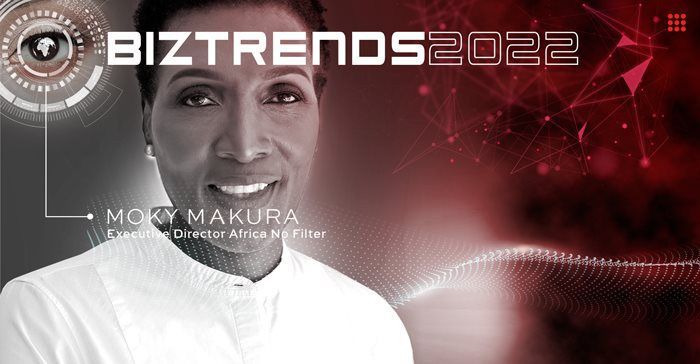#BizTrends2022: The future of media with Moky Makura

Moky Makura, executive director of Africa No Filter, is a pioneer in finding true African stories and understanding how to give storytellers a platform to tell their stories.
For #BizTrends2022, hosted by Bizcommunity on 2 February 2022, Makura spoke about the future of media - and how soft news with hard data seems to be the way forward - and highlighted three trends.
People are tired of news
Makura spoke about research that looked at the state of digital news consumption in Kenya. This research analysed close to 180,000 news posts from Facebook and Instagram from 16 of Kenya’s top news media outlets. This research was done in 2019 and revealed that the stories that people most engaged with were human interest stories.
Simple, engaging, and stories about people were the ones that saw the most engagement. Stories that were inspirational, funny and accessible - things that could uplift the spirits and provide some sort of satisfaction. The data shows that people want soft news.
But what makes a good story? Well, according to Makura, there are five things you need:
- You need a human at the centre of the story, a hero or heroine
- You need good context and setting
- A clear storyline, somewhere to take the story
- A challenge, some kind of obstacle or conflict that the human at the centre needs to face
- And at the end of it, you need some kind of resolution - which will be the satisfaction element.
“Great stories entertain, they inspire, they build familiarity and trust, and people are increasingly gravitating towards that,” Makura said.
But how do people want to consume their media?
The research showed that more people spent more time watching TV at home than they did listening to music, gaming, engaging on social media, and browsing the internet (with the exception of Gen Z’s, who spent most of their time gaming).
What this data tells us is that this is an increasingly digital world. Audiovisual content is extremely important to the consumer - especially when you consider statistics like the fact that people watch an average of 16 hours of video a week.
The growth of video
HubSpot asked YouTube viewers why they watch video content, and the top seven reasons they gave were as follows:
- It relaxes them
- It teaches them something new
- They are able to ‘dig deeper’
- It makes them laugh
- It relates to their passion
- The content is inspiring
- It makes them forget about the world around them
As we can see, people are watching videos to escape and to feel content. “One of the biggest trends we’ve seen, especially during the pandemic, is the growth of video on demand, and free streaming platforms,” said Makura.
The African Television Broadcast sector is growing as well. Just three decades ago, there were 10 commercial operators on the continent, and today, there are well over 1,000. It’s not only happening on the internet.
What an opportunity for brands.
Brands funding films
According to Makura, film is the most influential media for telling stories, and brands need to leverage this. This is not about brand-specific stories, but rather about taking the essence of storytelling and investing in creating films
For example, if we look at the Nike Breaking2 film, we see how this can be used effectively. A story about three athletes who are looking to break barriers, we find ourselves with content that doesn’t speak to the Nike brand story, but rather their story. The story that the audience can relate to. In fact, the only ‘mention’ of Nike is that you can see some of their branding on the clothing the athletes wear.
This is not a branded film, but a brand-funded film that raises awareness about issues the brand cares about.
The Most Dangerous Town on the Internet is a two-part documentary centred on a Romanian town that is well known for hackers. The film dives into cyber-crime and digital threats, and features international hackers and scammers who share their secrets. The brand behind this film is Norton, an anti-virus and security software company.
There are a number of US brands that are venturing down this path of brand-funded films; HP, Nutella, and Airbnb among them. They are all investing in making films with real stories that are aligned to their brands.
“Here is the opportunity I see for Africa,” Makura said. “The film industry on the continent is ripe for similar partnerships between filmmakers and brands.”
In 2021, Unesco published a comprehensive mapping of Africa’s film and audiovisual industries. The report showed that the sector is underfunded and underdeveloped. It's estimated that the sector currently employs about five million people, and accounts for about $5bn in GDP. “The important thing is there is a film industry in Africa,” Makura said, “Most countries are creating movies.”
Nigeria’s Nollywood, for example, is the second-largest film producer in the world. They produce about 2,500 films every year. Ghana and Kenya produce about 600 each. Tanzania produces about 500, which is on par with the number Hollywood produces.
“This is proof that the sector is growing. With limited input from both the private and public sectors. This is all organic,” Makura said. ”Where some see challenges, I really see opportunities for brands.”
Africa is a youthful continent, and it is rich in talent and creativity. Modern technology is making film-making more accessible and a lot more affordable. Distribution opportunities are growing, and the quality of films is getting better. A Unesco report showed that there is massive potential for this industry - there is a belief that this sector has great potential to create over 20 million jobs and contribute $20bn to the continent’s GDP.
However, the private sector needs to take this opportunity and step in to make this viable. “That is the real opportunity for brands in Africa - to do well and do good,” Makura said.
This has the potential to do three things:
- Create great, compelling stories that are brand-aligned, told by Africans for African audiences
- Stimulate the market and capitalise on the rich creativity that exists in Africa
- Create more jobs in the creative industries
“I really think that there’s a win-win opportunity for brands and filmmakers in Africa,” said Makura. “And that will see more and better, much better, films coming out of Africa. And that is the trend that Africa is ready, with open arms, to receive.”
Moky Makura the executive director of Africa No Filter, a donor collaborative focused on shifting the African narrative in the media. She is also a TV presenter, TedX speaker, producer, author, publisher and successful entrepreneur. Follow @mokymakura and @africanofilter


































